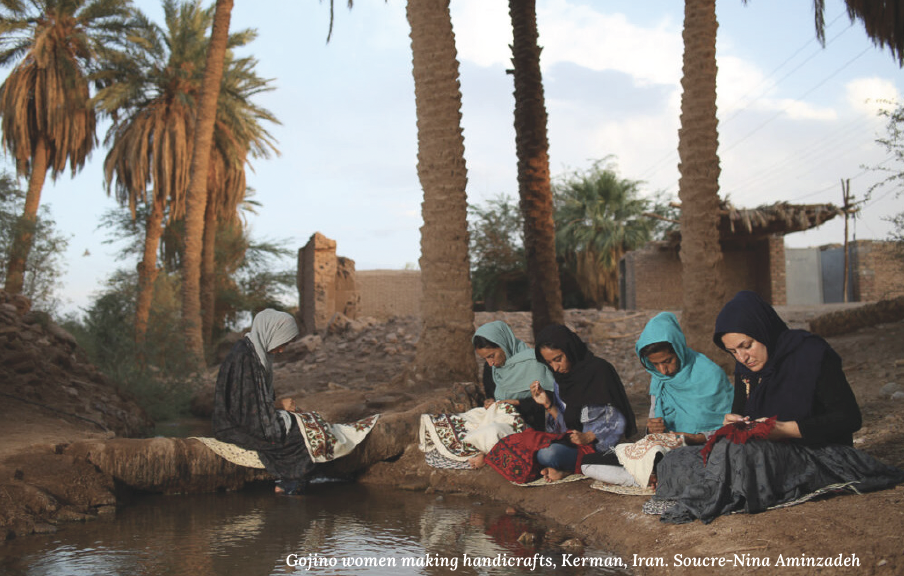Heritage at the Forefront of Climate Action: Reflections from ICCROM’s Net Zero Conference
ICCROM’s First Aid and Resilience for Cultural Heritage in Times of Crisis (FAR) programme is proud to share key reflections, strategies and insights gained from its global conference, Heritage-Based Climate Action, held from 25-27 March 2024, which brought together over 1,400 professionals from more than 120 countries. With dynamic exchanges, robust discussions, and powerful storytelling, this three-day conference transcended boundaries, forging vital connections between heritage preservation, climate action, disaster resilience, and sustainable peace.
The newly-released report compiles the presentations and discussions from the event speakers, representing over 20 disciplines. It takes a significant step forward in integrating concerns for heritage safeguarding into climate adaptation and disaster risk management policies at both national and subnational levels.
A Sneak Peek into the Conference
The Heritage-Based Climate Action conference marked the culmination of the pioneering Net Zero: Heritage for Climate Action project, launched by ICCROM’s FAR programme in 2022 with the generous support of the Swedish Postcode Foundation.
As the final milestone of the Net Zero project, the conference served as a platform to showcase integrated strategies for heritage safeguarding, disaster risk reduction, climate action, and peacebuilding. Reflections from the project, along with new insights, were shared during the event, highlighting transformative actions implemented at five key heritage sites—Jodhpur, India; Kasese, Uganda; Rashid, Egypt; Ubatuba, Brazil; and Tuti Island, Sudan—each impacted by intersecting climate-related disasters and conflicts driven by environmental stressors.
Learn more about the Net Zero project
Insightful panel discussions, engaging story circle workshops, and dynamic Ignite talk sessions opened new avenues for cross-disciplinary research and collaboration to bridge knowledge gaps in safeguarding heritage amid climate change, while leveraging indigenous and traditional knowledge for equitable climate action.
The extensive global participation of individuals from diverse backgrounds and fields emphasized the urgent need for collaborative solutions to address the impacts of climate change on heritage and the role of culture in advancing climate action. From Indigenous knowledge holders and community-based organizations to scientists, thought leaders, and decision-makers, the conference united diverse voices committed to integrating culture into sustainable and resilient human responses to climate change while safeguarding heritage. The virtual conference was structured around three interconnected themes that shaped the presentations, panel discussions, and interactive sessions.
Thought Leaders on Integrating Heritage Protection into Climate Policies
The conference was opened by leaders and scholars such as Senator Dr. the Hon Shantal Munro-Knight of Barbados, His Excellency Mubarak Al Nakhi, Undersecretary of the Ministry of Culture of the United Arab Emirates, Alexandra Xanthaki, United Nations Special Rapporteur in the field of cultural rights, acclaimed anthropologist Professor Lynn Meskell and Jyoti Hosagrahar, Deputy Director of the UNESCO World Heritage Centre, who shared insights on integrating heritage conservation with climate policy. These diverse perspectives and discussions emphasized how culture can fuel just climate action and inclusive disaster risk reduction. See the Panel Recording here.
“Barbados covers 166 square miles and is home to 266,000 people. Being an island, we have large coastal and fishing communities, as well as farming communities. Consequently, the issue of climate change is very significant for us. We deal with its impact every single day, and addressing these changes depends on maximizing and leveraging the resilience of our society and culture.”
— Senator Dr. the Hon Shantal Munro-Knight, Minister of State in the Prime Minister’s Office, Barbados
Stakeholders Roundtable Reinforce the Transformative Case Studies from Net Zero Project Sites
One of the key panels of the conference featured the Net Zero teams from five project sites, who presented their case studies showcasing participatory, transformative actions that leveraged community-held traditional knowledge to tackle climate risks. These efforts were further reinforced by local stakeholders from each site—national disaster management authorities, local representatives, and Indigenous knowledge bearers—who provided invaluable insights into the implementation of heritage-based climate action and highlighted the key factors driving their success.
“Through this participatory risk assessment carried out through the field project in Rashid, Egypt, the parliament has started improving sewage systems as one of the risks that emerged was the failure of wastewater management that is widely affecting the fishermen and farmers of Rashid.”
— Dr. Hisham El Gahel, Member of the Parliament, Rashid, Egypt
Pioneering Solutions from Small Island Developing States (SIDs)
Dedicated panels in the conference also featured pioneering solutions from Small Island Developing States (SIDs), showcasing best practices from Trinidad and Tobago, Seychelles, and Antigua and Barbuda for safeguarding heritage amid the climate crisis.
Traditional and Indigenous Knowledge for Heritage Safeguard and Climate Resilience
In the "Under the Talking Tree" session, an intergenerational dialogue brought together emerging professionals and Indigenous leaders to explore how traditional crafts, vernacular architecture, and natural resource management can enhance climate resilience and contribute to the net-zero goal. Discussions emphasized that Indigenous worldviews hold significant potential to address critical challenges, including climate change. By leveraging traditional knowledge to enhance adaptive capacities, it became evident that culture and heritage play a crucial role in driving just and inclusive climate action, building a resilient future for all.
What's Next
A major outcome of COP28 was the adoption of the Framework for the Global Goal on Adaptation (GGA), with cultural heritage included as one of its seven thematic targets—a significant milestone. Building on the Net Zero project’s outcomes, ICCROM is committed to strengthening this framework by offering multilingual tools and cross-disciplinary training.
ICCROM calls on its Member States to support this initiative by integrating heritage-based climate action into their national policies and frameworks, ensuring communities at the forefront of the climate crisis are protected and resilient.
The release of the conference report marks a crucial resource for stakeholders across sectors, offering actionable strategies for heritage-based climate resilience. As ICCROM continues to work towards this cause, the report serves as a foundation for future collaborations to safeguard cultural heritage while addressing the climate crisis.


